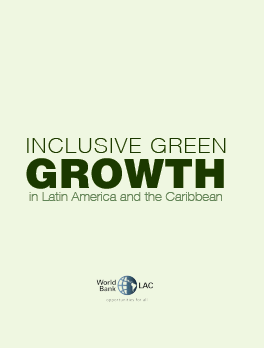The World Bank publication demonstrates how Latin America has been the world's testing ground for inclusive green growth through socially inclusive innovation, and investigates successes and challenges in mainstreaming sustainable practices in urban planning, the energy sector, water and sanitation services, and urban transport in Latin America.
 31 May 2012: The World Bank has released a new publication on inclusive green growth in Latin America and the Caribbean (LAC), highlighting experiences in promoting low-carbon growth within the region.
31 May 2012: The World Bank has released a new publication on inclusive green growth in Latin America and the Caribbean (LAC), highlighting experiences in promoting low-carbon growth within the region.
The paper, titled “Inclusive Green Growth in Latin America and the Caribbean,” focuses on LAC as a learning lab for inclusive green growth in terms of urban and infrastructure services, as well as natural resources and rural services. The first section of the publication demonstrates how LAC has been the world’s testing ground for inclusive green growth through socially-inclusive innovation, for example by adopting the first regional catastrophic risk insurance facility, as well as rapid bus transit systems, payments for ecosystem services and sustainable cattle ranching practices. It indicates that currently, the challenge is for such innovation to become mainstream in sustainable and urban development policies, infrastructure services, and natural resource use.
The second section focuses on green urban planning, the energy sector, water and sanitation services, and urban transport, noting the challenges these sectors face in adopting low-carbon growth strategies especially in low-lying cities vulnerable to extreme weather events. The third section looks at inclusive green growth objectives and progress in a rural context through reviewing issue areas such as rural transport, market access and connectivity, water resource management, and the agriculture sector, in each case highlighting objectives and challenges for the ‘greening’ of these sectors. [Publication: Inclusive Green Growth in Latin America and the Caribbean] [World Bank Press Release]